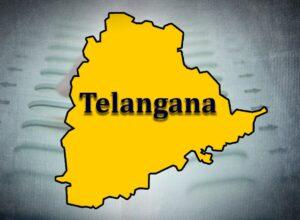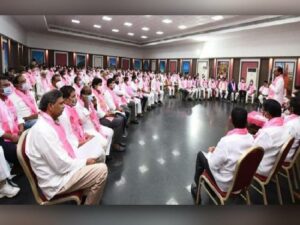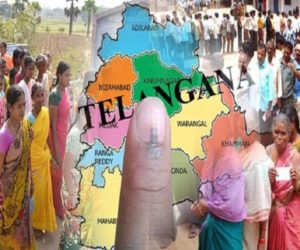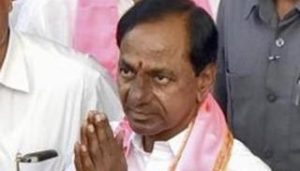The just concluded elections to the two seats of Telangana Legislative Council under Graduates constituency have once again raised the debate on how the political parties polluted the poll atmosphere.
When the Constitution of India provides a bicameral system at both the Centre and the State level and divides the State’s legislature into two parts – Legislative Assembly and Legislative Council – the purpose is to have a permanent House where the tenure of MLCs is six years. One-third of the members of State Legislative Council retire after every two years.
 This, it was felt, would ensure individuals who might not be cut out for the elections are able to contribute to the legislative process (like artists, scientists, etc) and can keep an eye on hasty decisions taken by the Legislative Assembly and use their experience and expertise in various fields in advising the government on important policy matters after an intense debate and function like think tank of the government in an apolitical manner. But unfortunately, the elders House has become more of a political rehabilitation centre and sort of extension of the lower House.
This, it was felt, would ensure individuals who might not be cut out for the elections are able to contribute to the legislative process (like artists, scientists, etc) and can keep an eye on hasty decisions taken by the Legislative Assembly and use their experience and expertise in various fields in advising the government on important policy matters after an intense debate and function like think tank of the government in an apolitical manner. But unfortunately, the elders House has become more of a political rehabilitation centre and sort of extension of the lower House.
Debates and discussions are now on the lines of respective political parties and not on merits of the content. The ruling party tries to use it as endorsement centre of its decisions and not for analysis of the pros and cons of policy matters. According to the Constitution, one-third of the members of the Council are to be elected by electorates consisting of members of local bodies like municipalities, district boards etc. Another one-third are to be elected by MLAs.
 One-twelfth of MLCs are to be elected by an electorate consisting solely of graduates and another one-twelfth by an electorate consisting of teachers. The remaining members are to be nominated by the Governor from among those with special knowledge in various fields. Unfortunately, even the process of elections of MLCs by graduates has turned into a battle where money power, religion and caste creep into the highly divisive election campaign. But neither the national parties nor the regional parties are willing to address this issue. “Jo Jeeta Vohi Sikander,” seems to be the attitude.
One-twelfth of MLCs are to be elected by an electorate consisting solely of graduates and another one-twelfth by an electorate consisting of teachers. The remaining members are to be nominated by the Governor from among those with special knowledge in various fields. Unfortunately, even the process of elections of MLCs by graduates has turned into a battle where money power, religion and caste creep into the highly divisive election campaign. But neither the national parties nor the regional parties are willing to address this issue. “Jo Jeeta Vohi Sikander,” seems to be the attitude.
There have been many instances where workers of political parties (no exception) were caught distributing money to the graduate voters. The only difference is that the distribution was a bit more decent. Money was packed in envelopes and were handed over to the voters. Ruling party poll in-charges ensured that the voters go the polling booth by making arrangements for transportation. SMS and phone calls were made informing the voters saying that the vehicle was on its way to pick them up. What was the result?
 Despite heavy voter turnout and the Opposition claiming that the votes polled by all Opposition candidates including the independents were more than what the TRS candidates had polled, the results went in favour of the ruling party. This only shows how the political parties are self-centred and instead of joining hands and putting up a united fight against the ruling party, everyone wanted to fight for its share of political space and the adage “divided we fall” has once again proved to be right.
Despite heavy voter turnout and the Opposition claiming that the votes polled by all Opposition candidates including the independents were more than what the TRS candidates had polled, the results went in favour of the ruling party. This only shows how the political parties are self-centred and instead of joining hands and putting up a united fight against the ruling party, everyone wanted to fight for its share of political space and the adage “divided we fall” has once again proved to be right.
The core issues related to this election where graduates, intellectuals, professionals, teachers, employees and employment, which otherwise were to hog the limelight, were dominated by allegations and counter-allegations. It is also a matter of shame that the graduates have allowed themselves to get lured for a couple of thousand rupees given by political parties.
Is this the wisdom the graduate voters and candidates should have displayed? If that is the case, how can we expect them to play the role of wise man in the Council? Is there no way to cleanse the political pollution which has turned more dangerous than environmental pollution? ‘Jago India.’
On the other hand, buoyed by the victory of both his candidates in the graduate MLC polls, despite the steep odds, TRS chief K. Chandrashekar Rao has shifted his focus to the upcoming Nagarjunasagar bypoll on April 17. Party sources said that Mr Chandrashekar Rao will lead the party’s election and campaign strategy for the bypoll, just like in the MLC polls.
 Party leaders and cadre strongly believe that the MLC poll results have boosted the party’s sagging morale and confidence, just in time for the Nagarjunasagar bypoll. Euphoric TRS leaders say that these two wins have brightened the party’s victory chances and help create a -counter-narrative that there is no anti-incumbency, as is being projected by opposition parties.
Party leaders and cadre strongly believe that the MLC poll results have boosted the party’s sagging morale and confidence, just in time for the Nagarjunasagar bypoll. Euphoric TRS leaders say that these two wins have brightened the party’s victory chances and help create a -counter-narrative that there is no anti-incumbency, as is being projected by opposition parties.
 As is, Chief Minister Chandrashekar Rao had already kickstarted the party’s campaign for the Nagarjunasagar bypoll by addressing a public meeting at Halia on February 10, in which Mr Rao showered sops worth several hundreds of crores of rupees for local development.
As is, Chief Minister Chandrashekar Rao had already kickstarted the party’s campaign for the Nagarjunasagar bypoll by addressing a public meeting at Halia on February 10, in which Mr Rao showered sops worth several hundreds of crores of rupees for local development.
It is noteworthy that after the Assembly elections held in December 2018, Mr Rao had entrusted election management responsibilities to his son and party working president K.T. Rama Rao. Mr Chandrashekar Rao did not even campaign for the party in the Dubbak bypoll, whereas in the GHMC elections, he addressed a solitary public meeting on the last day of campaign.
Though the TRS party had achieved great results under Mr Rama Rao, it suffered setbacks in the Dubbak Assembly bypoll and the GHMC elections in 2020-end at the hands of BJP. This gave scope for the BJP to project itself as the principal opposition in Telangana and the sole force with a capacity to dethrone the TRS in the next Assembly polls.
 Amidst this phase of gloom, the MLC poll challenge came as an opportunity for the TRS supremo to directly spring into action and try to deal a crushing blow to the BJP narrative. Mr Chandrashekar Rao monitored all election-related strategies, from enrolment of graduate voters to booth management.
Amidst this phase of gloom, the MLC poll challenge came as an opportunity for the TRS supremo to directly spring into action and try to deal a crushing blow to the BJP narrative. Mr Chandrashekar Rao monitored all election-related strategies, from enrolment of graduate voters to booth management.
For the first time, he even embarked on micro-level election management, once the focus shifted to booth-level and even individual-level, as the party reached out to every single voter, which the party believes really worked wonders. In the MLC polls, TRS could wrest the BJP seat besides reducing it to fourth place in another seat, sending a message that BJP was not really an alternative to the TRS.
Rao now wants to extend this strategy to the Nagarjunasagar bypoll by deputing ministers, party MLA, MLCs and MPs as election in charge, who will camp in the constituency till elections end.
Since the Yadav community is numerically strong here, Mr Rao has already announced sops for them in the recent Budget, including a return to the distribution of sheep program. He has decided to field a candidate from the Yadav community to take on Congress heavyweight K. Jana Reddy.
 Similarly, Mr Rao is expected to announce a new PRC for state employees and pensioners in the Assembly in a day or two in the ongoing budget session. He will also announce a recruitment drive to fill over 50,000 jobs in various government departments.
Similarly, Mr Rao is expected to announce a new PRC for state employees and pensioners in the Assembly in a day or two in the ongoing budget session. He will also announce a recruitment drive to fill over 50,000 jobs in various government departments.
The party hopes to garner support from employees and students with these moves and is counting on that making a crucial difference to the bypoll. #KhabarLive #hydnews







